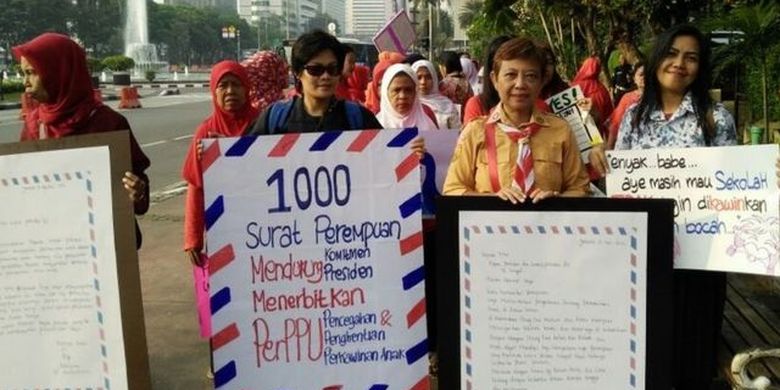Anindya Vivi: Fighting for Women's Rights Endlessly in Indonesia

JAKARTA, KOMPAS.com - The position of women in the transformation era of Indonesia is still considered problematic. Women would sometimes still face pressure to surrender their ambitions and identities to the rigors of the suburban hearth and home. But Anindya Restuviani or Vivi’s view is always broader.
Vivi’s childhood was not the worst case for a survivor of gender-based discrimination. She was raised in Semarang, Central Java within the sphere of double privileged families, being a Muslim and a Javanese. Her late father was also an activist, making the whole family fully aware of gender issues.
Her first letdown might have come from her grandmother. She was a teacher, which sounds like a profession that is aware of the importance of education. In truth, she held or perpetuated biased perceptions of educational discrepancies for males and females.
“‘You don’t have to get your education way too high or no man's going to marry you,’” said Vivi, recalling her grandmother talking to her.
In middle school, Vivi spent six years in an Islamic boarding school. There, as a female student, she had trouble with certain educational facilities.
“Since then, I knew there was something wrong with the world but that it was not yet my true calling until I furthered my studies in a university where I encountered and looked deeper to more gender issues,” Vivi said.
“That was when I decided to work for gender equality. Things that I saw outside my comfort bubbles definitely affected me, but there was also something personal that drove me.”
Since then, Vivi has been proud to call herself a feminist. She became the project director of Jakarta Feminist, an organization that fights for the fulfillment and protection of the rights of women and other marginalized groups based and the committee behind the Women's March Jakarta (2017-2021) and the Feminist Fest (2017 and 2019).
Protects women when the law won’t
Legal barriers in some key areas, however, coupled with a patriarchal culture and religious conservatism, continue to prevent Indonesian girls and women from fulfilling their rights.
“I think a lot of Indonesians would say we have received gender equality because girls can go to school or women can find decent jobs, but that statement is not looking deeper to the quality of life of women in Indonesia,” said Vivi.
“A lot of people would also say we have received gender equality because we have women representatives in the government.”
Despite the increasing women’s participation in government at all levels, Vivi sometimes questions who these women are representing. Fighting for women’s rights for years with the government still not being responsive towards, Vivi knows that Indonesia still has a long way to go to achieve gender equality.
 An image of some activists march along streets in Indonesia.
An image of some activists march along streets in Indonesia. “There are so many laws that are in the struggle to get passed and those are the laws that women and marginal communities desperately need. I mean, the protection of domestic workers' bill has been sitting on the national priority list for 17 years!” said Vivi.
Known locally as RUU Perlindungan Pekerja Rumah Tangga (RUU PRT), the bill contains protections for domestic workers' rights, including the introduction of a standardized minimum wage, regulated working hours, regular days off, and protection from mistreatment and violence.
Vivi is also concerned about how the House put brakes on the deliberation of laws that women desperately need, such as the sexual violence bill (known as RUU Penghapusan Kekerasan Seksual). The House claimed deliberation of the bill was “complicated”, even though lawmakers had never deliberated the legislation and had already deferred the discussion for years.
The sexual violence bill, if passed, would prohibit the criminalization of victimhood and would forbid law enforcement to blame or degrade victims or to saddle victims with the responsibility of searching for evidence in their own cases.
Feminism and the women's rights movement in Indonesia began during the colonial era under Dutch rule and were spearheaded by the national heroine Kartini. From then, Vivi acknowledged that there has indeed been progressing, but it also faces regress.
“Even if RUU PKS were to be passed, we were not just going to sit and cheer. That is definitely progress, but we still have a long way to go because we still have to watch and supervise its implementation and all of that stuff,” said Vivi.
“The increasing religious radicalism, for example, also contributes a lot for the set back of gender equality in Indonesia.”
Broken systems hurt women during the Covid-19 pandemic
As the Covid-19 pandemic deepens economic and social stress coupled with restricted movement and social isolation measures, gender-based violence is increasing exponentially. Many women are being forced to ‘lockdown’ at home with their abusers at the same time that services to support survivors are being disrupted or made inaccessible.
All of these impacts are further amplified in contexts of fragility, conflict, and emergencies where social cohesion is already undermined and institutional capacity and services are limited.
Indonesian women carry the burden of unpaid work, including caregiving, due to persistent gender inequality in Indonesian society and segregation in the labor market. This burden has only multiplied during the pandemic.
“The cause is not the current pandemic. Before the pandemic, this already happened. However, the pandemic has made things worse and when the pandemic is over one day, do we still want to see the same society where women and minority groups are facing oppression? I don’t,” said Vivi.
For this reason, it then became one of Vivi’s demands for the government that she brought through the 2021 Women’s March Jakarta: the haunting Shadow Pandemic of increasing violence and discrimination, making women and minority groups more vulnerable than ever.
In Women’s March Jakarta every year, people of different genders, occupations, and religions gathered to show their support for better protection and empowerment of women amid rampant violence perpetrated against them.
Activists gave the government demands that cover various topics, including the long-awaited sexual violence and domestic worker protection bills, the elimination or revision of discriminative laws and by-laws as well as social protection for every gender and social group.
The annual march is only a part of the broad feminism movement across Indonesia. It was organized by feminist groups in the capital, including the famously vocal Jakarta Feminist Discussion Group. However, the common wrongheaded thinking about feminism, said Vivi, is that only certain people qualify to fight the battle for women’s rights.
“If I was only looking at myself, sheltered with all of those privileges and that my family is very supportive towards gender equality, I would not think there was a problem.”
“However, I believe in intersectional feminism. I am not free until every woman is free despite their struggles being very different from my own. I will not rest until everyone has their freedom. That is how far I think my fights will go,” she added.
Simak breaking news dan berita pilihan kami langsung di ponselmu. Pilih saluran andalanmu akses berita Kompas.com WhatsApp Channel : https://www.whatsapp.com/channel/0029VaFPbedBPzjZrk13HO3D. Pastikan kamu sudah install aplikasi WhatsApp ya.































